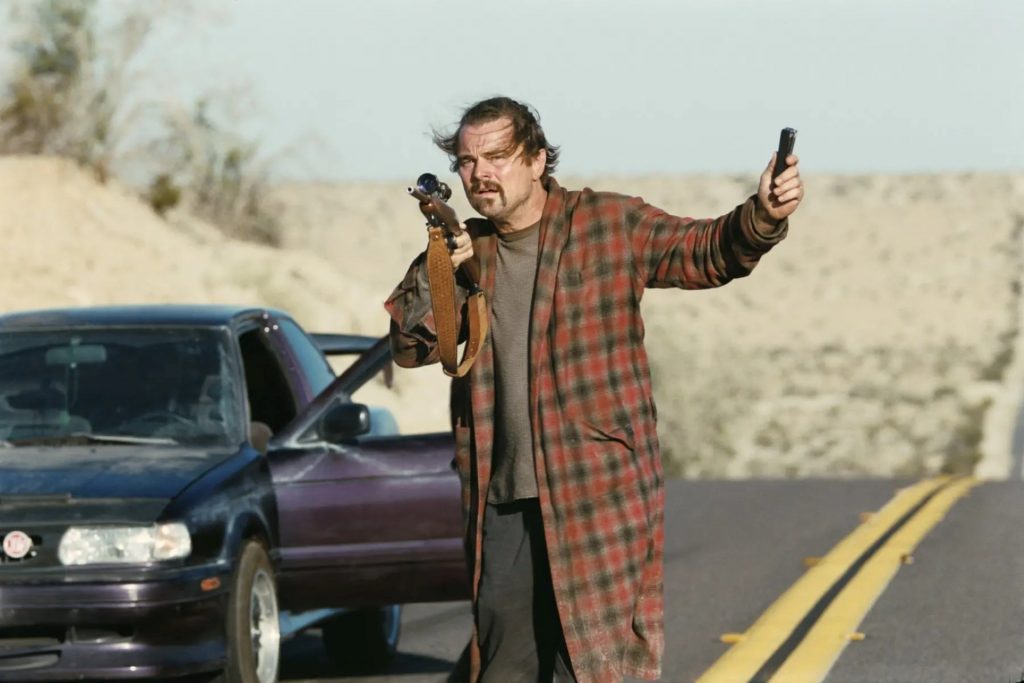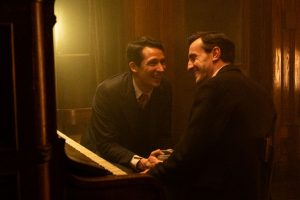Reviews include The History of Sound, Him, and A Big Bold Beautiful Journey.
TFCA Friday: Week of Sept. 26
September 26, 2025

Welcome to the TFCA weekly, a round-up of reviews and coverage by members of the Toronto Film Critics Association.
In Release this Week!
Dead of Winter (dir. Brian Kirk)
“Not so cosy, Emma Thompson’s new film. She leaves her signature humorous, romantic, period and contemporary films for something brutally intense,” writes Anne Brodie at What She Said. “Thus launches a bloody, nasty, survivalist, insane trip forcing Barb to rely on her wits and instinct to stay alive and rescue the girl. A shocking turn in Thompson’s repertoire, a change of pace and one helluva frosty, ugly ride.”
“Dead of Winter is very much a genre exercise. Emma Thompson, the focus of the film, is full value as Barb, a solid Minnesota lady of substance. Think Frances McDormand in Fargo, without the quirky flourishes, and you have Ms. Thompson in the film,” says Marc Glassman at Classical FM. “She is likeable in the film. If she decides to make more films like this, let’s hope she does the next one in Canada. After all, we’re just as enjoyable as the Finns.”
Eleanor the Great (dir. Scarlett Johansson)
“Let’s celebrate June Squibb! Hardworking, tiny, mighty, she has an uncanny acting gift – a mix of power and subtlety…Squibb carries off an imperfect character with tremendous glee, and charm, and kudos to Kellyman for her sensitivity,” notes Anne Brodie at What She Said. “Her light touch is moving, but we see the burden behind it. The film’s a celebration of life, a stinging reminder of the pain of the deaths of people we love. Frailty, whims, corrections, surviving and connection are beautifully expressed in his lovely human story.”
“Eleanor the Great is a small-scale film with depth and relatable themes: grief, loss, identity, family among them. The film has some flaws that lessen its emotional impact but there is admirable work here all around,” says Karen Gordon at Original Cin. “It’s a particularly interesting project for Johansson’s first film. She has chosen to do something with no flash but a lot of heart, and that relies on her ability to find the right tone. And that she does. Johansson directs with a light hand, and shows restraint, refraining from letting the film fall into some natural traps of melodrama or sentimentality that would have undermined it. Still, Nina ends up being the heart and soul of the film. Credit for that goes to Kellyman’s quiet and thoughtful performance.”
“Eleanor the Great is not a great film and holds few surprises, but it is a decent well-intentioned cautionary tale by Squibb and Johansson that should entertain while providing a lesson or two,” adds Gilbert Seah at Afro Toronto.
“Johansson knows a good scene when she sees one,” says Kim Hughes at Original Cin, who gets some words with the director and cast. “You just never know who is grieving or, as someone once said to me, you never know what’s going on in someone’s living room,” says Johansson. “And it’s true. You never know what people are carrying around with them. But all of us have multiple things going on all the time. Part of you is grieving and part of you is trying to get on with your day. We compartmentalize. The gift of these actors is to have all of that going on in their body language and faces. I’m just watching and making suggestions and adjustments or whatever.”
“At once admirable and wobbly, Johansson’s first turn behind the camera – she neglects to give herself a supporting role, a temptation that is usually high for many actors-turned-directors – is consistently intriguing, if not always for the right reasons. Johansson possesses a sharp eye when it comes to a sense of place, whether it be Eleanor’s Florida stomping grounds or the Manhattan enclave of Yorkville, an Upper East Side neighbourhood that was once home to much of the city’s Jewish community,” writes Barry Hertz at The Globe and Mail. “The director also has a firm grasp on character, allowing the always wonderful Squibb – still staring down performers half her age, or younger – to work her usual magic as the unflappable but also deeply wounded Eleanor.”
“Like many actors who take on the role of director—from Charles Laughton to Robert Redford—Johansson has been able to draw top notch performances from her main actors. It’s not just June Squibb and Chiwetel Ejiofur, playing Nina’s journalist father, who are unsurprisingly excellent in their key roles but such less established names as Erin Kellyman and Rita Zohar are absolutely persuasive in their significant parts,” says Marc Glassman at Classical FM. “Johansson isn’t a bravura director; there are no stunning shots in the film. But what we get is a solid, professional visual approach, which allows Johansson’s actors to dominate their scenes in a properly dramatic fashion.”
“Squibb enjoys a career-best performance as Eleanor navigates her grief, offering her signature sense of human in a performance that carries layers of history,” says Pat Mullen at That Shelf, who gets some words with Squibb and director Scarlett Johansson. “I like the collaborative experience of the work that we do very, very much,” Johansson notes. “I’m an actor who loves to be on set. I love to talk to people. Maybe it’s because I was a kid actor and grew up on set, but I’m not someone who needs to be alone in my room preparing. I really love the community that we have on set, so I think this was an extension of that passion.”
French Lover (dir. Nina Rives)
“As far as romantic comedies go, there are few surprises in the Harlequin type romance,” says Gilbert Seah at Toronto Franco. “There is the odd first meeting of the couple, in this case at a bar in which a misunderstanding occurs causing a drink to be splashed on Abel’s shirt. There is the obstacles to the couple’s romance, which in this case is Abel’s star presence. It does not take a genius to figure out that the couple will get together again. There is also the customary best friend of the male, which intros case is his buddy from childhood. The best thing about the film is, as expected, Omar Sy who spreads his charm in most scenes.”
The Lost Bus (dir. Paul Greengrass)
“The Lost Bus doesn’t quite measure up to the paths of destruction previously trodden by Greengrass. By unsteadily oscillating between tiny, almost insignificant personal melodrama and gigantic, all-consuming terror, the film (which is also saddled with a terribly off-putting title) struggles to sit inside Greengrass’s typical sweet spot of perfectly calibrated chaos,” observes Barry Hertz at The Globe and Mail. “Like Captain Phillips and its tremendous showcase for Tom Hanks, The Lost Bus finds its strength in the performance of its lead actor, Matthew McConaughey, who here plays a real-life bus driver named Kevin McKay.”
One Battle After Another (dir. Paul Thomas Anderson)
“One Battle After Another, freely riffing on Thomas Pynchon’s novel Vineland, is a political satire-turned-urban warfare epic,” says Peter Howell at the Toronto Star. “If The Master was about spiritual combat and There Will Be Blood chronicled economic ruthlessness, Anderson’s latest plunges headlong into literal battle, punctuated by rat-a-tat gunfire, shouted recriminations and constant generational and ideological crossfire. It may be Anderson’s best film; it’s certainly his most violent.”
“As in Pynchon’s book, One Battle After Another‘s lodestar is seemingly the worship of dependent clauses. Everything is expressed through a complicated web of interrelated, cascading backstories, tangential anecdotes and zany misadventures — while emotionally ping-ponging between dramatic No Country for Old Men-style chases and Looney Tunes-esque escapades,” notes Jackson Weaver at CBC. “That makes Anderson’s film an adequately manic interpretation of Pynchon’s vibe, if not the story. Elsewhere, Teyana Taylor surely delivers the most convincing and impressive performance of the film — no surprise, given the chops already displayed in the confoundingly beautiful A Thousand and One.”
“Director Anderson has proved himself apt at genres such as satire, black humour, and drama, all of which are blended into this action thriller,” writes Gilbert Seah at Afro Toronto. “The action sequences are fast-paced, examples being the raid of immigrant workers and the car chase at the end, with some amazing camerawork on display. This is that rare action thriller in which the hero is not a super fighter. The visuals and pacing are also energetic, with cinematography by both Anderson and Michael Bauman.”
“Everyone involved is doing their own part to keep the flames burning. DiCaprio is typically excellent as the oft-useless Pat/Bob, a burnout in more ways than one whose well-intentioned befuddlement recalls Joaquin Phoenix’s performance in Anderson’s last great stoner comedy, Inherent Vice,” says Barry Hertz at The Globe and Mail. “Yet it is Taylor and Penn who lord over everyone, the former offering a seismic preview of a career that is just beginning, the latter utilizing a career full of sometimes hammy, sometimes affecting work to deliver a magnificently perverted creation. The few moments in which Taylor and Penn cross paths, sequences that play with notions of power and pleasure to such a bug-eyed degree that you can feel the entire energy of the audience shift and squirm, represent cinematic alchemy.”
“No one does anxiety and stress quite like PTA. His movies are large scale stories that seem at times to ramble or take us to why-the-eff are-we-here moments. And yet, like a ride at the carnival, even when the film swings out in ways that you didn’t expect, you know you’re in safe hands. PTA never loses control. His movies can be maddening, full of weirdo characters. But by the end of the film, even if you’re still grappling with what you just saw, you’re sorry to see them go,” says Karen Gordon at Original Cin. “And they are always beautifully cast, meticulously shot and edited, with great soundtracks.
“Battle draws inspiration from Pynchon’s novel Vineland and the author’s sense of humour jives perfectly with Anderson’s own anti-establishment voice. It’s a work of anarchically comedic fury,” writes Pat Mullen at That Shelf. “There’s a fiery sense of rebellion to the movie, too. It’s as if Anderson knows he’s potentially setting fire to a huge whack of cash. Every frame of One Battle After Another seemingly runs contradictory to the risk aversion of contemporary Hollywood filmmaking. The originality, the energy, the grandeur, and the sheer expensiveness of it all proves consistently exhilarating. However, the film thumbs its nose seemingly in every direction and, at the same time, nowhere. The element feels especially Pynchon-esque and Anderson-esque: the French 75 are a joke, but at least they’re challenging lesser alternatives.”
Peak Everything (dir. Anne Émond 🇨🇦)
“Occasionally, particularly attuned audiences can see just what Émond is trying to do here in this tale of love in the face of the presumed final days (the film’s French title is the far better Amour Apocalypse), which is perhaps why the film has already enjoyed such a healthy festival life, having played the Directors Fortnight program at Cannes this spring, and closing out the Toronto International Film Festival the other week,” notes Barry Hertz at The Globe and Mail. “Peak Everything is far from a world-ending disaster. But it won’t save anyone, either.”
“The film is a strange love story of sorts,” admits Gilbert Seah at Afro Toronto. Director Émond gets her character, Adam, to cry, mope, and come to terms with himself. Her female characters, those that Adam encounters, like Tina and his kennel helper, have stronger personalities. It is hard to identify with a protagonist with self-worth issues, but the film feels too much like one with too much of a female slant.
“The film’s title conjures up a kind of end-times aesthetic — we’ve hit peak oil, peak climate change, peak political instability, you name it. Even the characters’ names fit the pattern, with Tina being an acronym for “there is no alternative,” and Adam’s therapist at one point pondering an abbreviation that includes anxious, depressive and atypical,” notes Chris Knight at Original Cin. “Émond’s films includes last year’s excellent dark thriller Lucy Grizzli Sophie, about a woman seeking revenge on an online bully. She brings a lighter touch and a more comic tone to this one, though the stakes — the French title is Amour Apocalypse — couldn’t be higher.”
Plainclothes (dir. Carmen Emmi)
“Director Emmi, for his first feature, tries hard to create an edgy film but fails,” observes Gilbert Seah at Afro Toronto. “Emmi includes three intercut story segments, which results in a disjointed narrative in which the suspense that has been built up is suddenly abrupt. His use of jarring images amidst handheld cameras is also more annoying than artful. Lucas’s facial hair in the New Year’s Eve party scene is at least, to help sort, which segment is on the screen, as it can get confusing to the audience which segment is going on.”
Lucas and Andrew dabble in a push-and-pull relationship as they navigate desires and double lives. Blyth and Tovey have blazing chemistry. Whenever they’re onscreen together, Plainclothes blisters with voracious lust for life that snuffs out the pensive melancholy that nearly suffocates them when they’re alone,” says Pat Mullen at That Shelf. “A strange and frequently incomprehensible aesthetic fractures the timeline. Old VHS shots and surveillance videos—millisecond snips in rapid-fire montages—inject ghosts of the past into the present. These chaotic montages come at random. They punctuate the film whenever it seems to be hitting its stride. Besides offering a nod to surveillance and the clandestine nature of the men’s rendezvous, the editing jumbles the tale. It proves more alienating and distracting than effective, a first feature falter that offers a superficial tic. And an extremely annoying one at that.”
Suspended Time (dir. Olivier Assayas)
“The two brothers, Paul and Etienne, get on each other’s nerves, which results in one shouting match,” writes Gilbert Seah at Toronto Franco. “Paul is more annoying, and watching these two on film can require a bit of patience. Yet Assayas’s film is not without charm. Though nothing much happens, and the nuances of the characters begin to bother each other.”
TV Talk/Series Stuff
At What She Said, Anne Brodie gives the lowdown on, well, The Lowdown: “A hearty handshake to creator Sterlin Harjo and FX home of some of the best, oddest and most original streaming stories around. The Lowdown holds its freak flag high.” Meanwhile, you can stream House of Guinness: “The loosely fact-based series is hugely entertaining, and a modern rock score adds a certain tang to the proceedings, reminding us that human nature ‘twas ever thus. Oh, and there are no longer any members of the Guinness family on the board. This will spell out why.” In the British Murder Before Evensong, “Its appearance contrasts with the darkness in an unknown local’s soul, so that’s fun.” Anne also has early word on the now-delayed The Savant starring Jessica Chastain: “incredibly, shockingly timely.”



